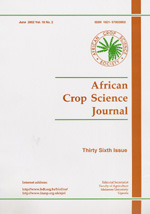
|
African Crop Science Journal
African Crop Science Society
ISSN: 1021-9730
EISSN: 1021-9730
Vol. 20, No. s2, 2012, pp. 303-316
|
 Bioline Code: cs12047
Bioline Code: cs12047
Full paper language: English
Document type: Research Article
Document available free of charge
|
|
|
African Crop Science Journal, Vol. 20, No. s2, 2012, pp. 303-316
| en |
ASSESSING CLIMATE CHANGE IMPACTS AND ADAPTATION STRATEGIES FOR SMALLHOLDER AGRICULTURAL SYSTEMS IN UGANDA
BAGAMBA, F.; BASHAASHA, B.; CLAESSENS, L. & ANTLE, J.
Abstract
The debate on whether climate change will impact on peoples’ livelihoods and, hence, the need to act is essentially
over and has instead shifted to the development of strategies needed by different regions and countries to adapt
to climate change effects. However, there is still scanty information necessary to ably address climate change
related issues. There is a considerable knowledge gap with respect to climate change impact, vulnerability and
adaptation to increased climate variability and change. In this paper, using the trade off analysis model, the
impact of climate change on peoples’ livelihoods and possible adaptation strategies to increase the resilience and
sustainability of agricultural systems in three regions of Uganda (central, Masaka and southwest) are analysed.
The results show that 70-97% of households will be adversely affected by climate change in Uganda. The
southwest will be most affected due to smaller farm sizes and limited livelihood alternatives. There will be no
positive gains from encroaching on swamps, which is one of the reported adaptation strategies to climate related
stresses. Improving productivity of important crops (bananas for southwest, and sweet potatoes and bananas
for central region), in addition to adoption of grade cattle will likely be a better adaptation strategy for climate
change.
Keywords
Adaptation strategies, resilience, vulnerability
|
| |
| fr |
BAGAMBA, F.; BASHAASHA, B.; CLAESSENS, L. & ANTLE, J.
Résumé
Le débat sur le fait que le changement climatique pourra affecter le mode de vie des populations et, ainsi la nécessité d’agir est arrivé et consiste à développer des stratégies en rapport avec les besoins de différentes régions et pays pour l’adaptation aux effets du changement climatique. Cependant, les informations disponibles sont encore insuffisantes afin d’adresser correctement les problèmes y relatifs. Il existe tant de lacunes sur les connaissances en rapport avec les impacts du changement climatique, la vulnérabilité et l’adaptation à la variabilité et changement climatique accrus. En utilisant le modèle du trade off analysis, cet article a analysé l’impact du changement climatique sur le mode de vie des populations et des stratégies possibles d’adaptation, afin d’améliorer la résilience et la durabilité des systèmes culturaux dans les trois régions de l’Ouganda (Centre, Masaka et sud- ouest). Les résultats montrent que 70-97% des ménages seront touchés par des effets du changement climatique en Ouganda. Le sud-ouest sera le plus affecté par suite de tailles petites de ses exploitations et son mode de vie à moyens alternatifs limités. L’invasion des marais ne rapportera aucun gain positif qui est une des stratégies d’adaptation indiquées au stress climatique relatif. L’amélioration de la productivité des cultures importantes (bananiers au Sud-ouest, et les patates douces et le bananier dans la région centrale) en plus de l’adoption des vaches améliorées pourra serait une meilleur stratégie d’adaptation au changement climatique.
Mots Clés
Stratégies d’adaptation, résilience, vulnérabilité
|
| |
© Copyright 2012 - African Crop Science Society
|
|
